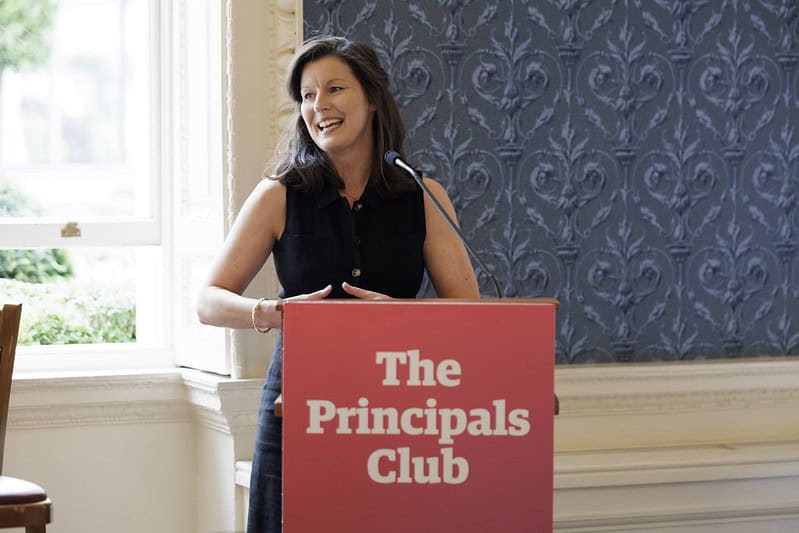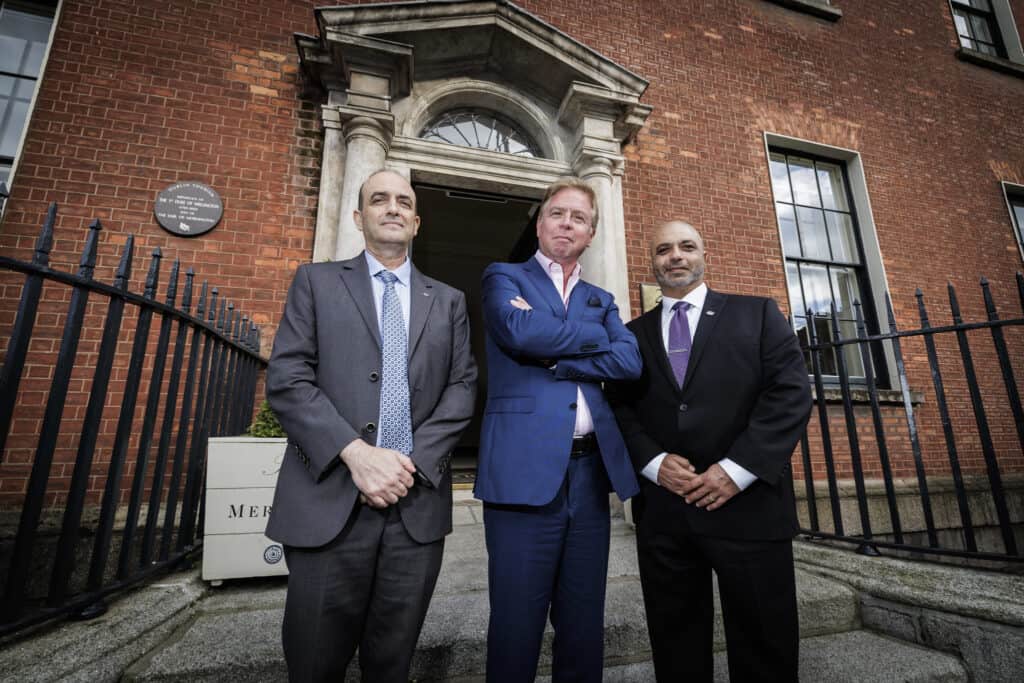Pictured (from l-r): Dr. Omar Hatamleh NASA, Ian Hyland, CEO Business & Finance and Yasser Haridi, NASA pictured at The Principals Club in the Merrion Hotel. Picture Andres Poveda
The Principals Club welcomed the AI leaders of the National Aeronautics and Space Administration (NASA) to the Merrion Hotel last week for the start of Dublin Tech Summit 2024.
The Prinicpals Club, a forum for international business leaders events, hosted an evening at the Merrion Hotel last week, centred on the theme: “How emerging technology and AI is changing industry forever.”
After a meal, the guests were treated to a fireside chat with Dr. Omar Hatamleh, Chief Advisor, Artificial Intelligence & Innovation for NASA and Yasser Haridi, Chief Enterprise Architect and OCIO Chief for Strategy and Architecture for NASA, moderated by Oisin Lunny. The event was to celebrate the start of Europe’s fastest growing tech festival, the two-day Dublin Tech Summit which took place in the RDS, Dublin.

Pictured: Sarah Freeman, Managing Editor Business & Finance and MC for the night.
Sarah Freeman, Managing Editor, Business & Finance, was MC for the night. She reminded the guests that just one year prior, the discussion was all about the emerging AI technology and how it has embedded itself in the public consciousness with extraordinary speed. She welcomed the special guests, thanked Enterprise Ireland, Ibec and IDA Ireland for their continued support throughout the year and introduced the founder of the Principals Club, Co-Founder of Dublin Tech Summit and publisher of Business & Finance, Ian Hyland, who spoke about the growth of Dublin Tech Summit, now in its 8th year and the prospect of welcoming over 8,000 attendees to the festival over two days. He added it was an opportunity for Ireland to showcase the growth and innovation of the indigenous industry in this country.
Pictured (from l-r): Dr. Omar Hatamleh, Yasser Haridi, both NASA, and Oisin Lunny, Moderator.
Oisin Lunny started by asking our NASA guests about their stellar careers. Dr. Hatamleh is responsible for creating the AI Strategy and identifying and integrating cutting-edge AI and technology solutions that support NASA’s missions and goals. He was also the former Chief Innovation Officer, Engineering at NASA from 2015 to 2020. Prior to this, he was the Deputy Chief Scientist at NASA ARC responsible for identifying new and promising areas of scientific research and supporting technologies that can be integrated into the Centre’s capabilities. He has 27 years’ experience at NASA and has published over 33 international journal articles in engineering with over 1400 citations, and has received multiple awards and recognitions.
Yasser Haridi has 25 years of experience in leading change and development for renowned multinational organisations such as Siemens, Lockheed Martin, and NASA, where he developed practical skills in strategic planning, enterprise architecture, systems engineering and digital transformation. He is a certified Federal Enterprise Architect and a certified executive coach. He holds a B.S. degree in Electrical Engineering, an M.S. degree in Computer Engineering, and an MBA in Technology Management.
Dr. Hatamleh really captured the audiences’ imagination when he spoke about longevity and the use of AI in prolonging human health and life. He said: “Longevity is being classified as a disease and that means as a disease there’s a cure for it by classification. We know there are nine hallmarks of ageing in humans. We know exactly what each one is and AI is helping us tackle each and every one of them.”
He also spoke about the prospect of printing 3D human organs from stem cells and ensuring it’s a perfect fit for the recipient thereby obviating the need for years of anti-rejection drugs.
Haridi spoke about humans traveling to Mars, something that would require an 8 month trip. The research NASA is doing will reduce the impact space travel will have on the human body. Travel distances will also become truncated with long-haul trips reduced to mere minutes with the tech developments in the offing.
The audience became very engaged in the discussion about AI and creativity with contributions from the floor by Eimear Noone, the award-winning Irish composer and conductor and Joan Mulvihill, artist and Digitalisation, Creativity, Sustainability Evangelist at Siemens who both challenged Dr. Hatamleh’s assertion that AI creates the best art and music. It was a fascinating start to the two-day tech festival where the lastest developments in technology were to be discussed by thought leaders from all over the world.
Pictured (from l-r): David McCourt, Seamus Hand and Yasser Haridi.
Read more:
Dublin Tech Summit explores impact of AI on humanity
Day 2 of Dublin Tech Summit features exciting discussions on tech disruption, diversity and robotics

